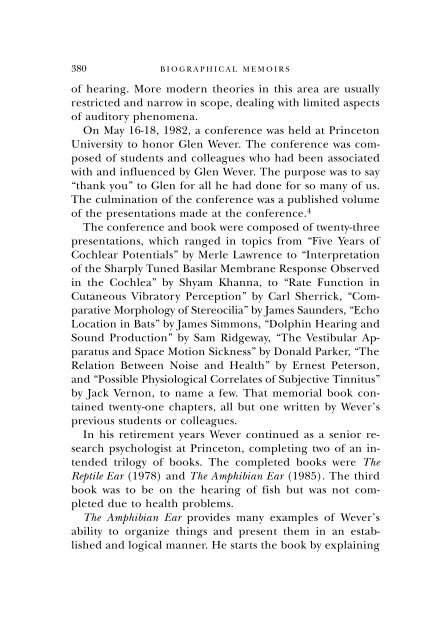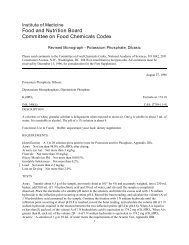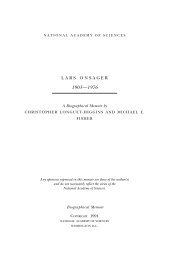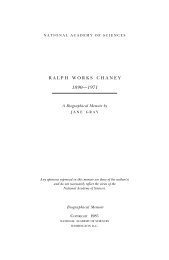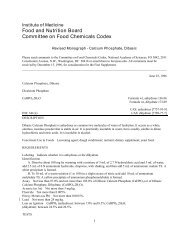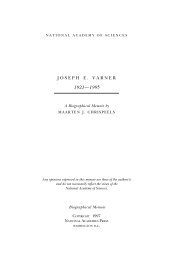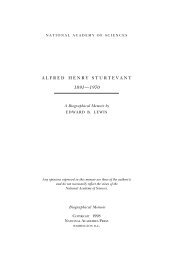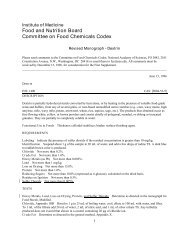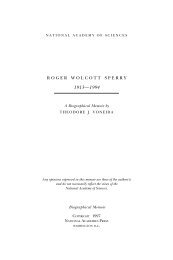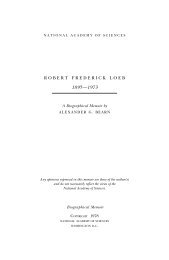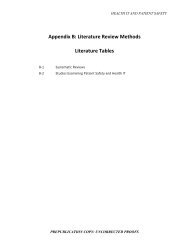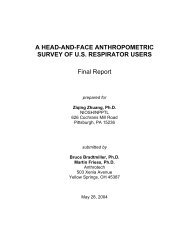ERNEST GLEN WEVER - National Academy of Sciences
ERNEST GLEN WEVER - National Academy of Sciences
ERNEST GLEN WEVER - National Academy of Sciences
Create successful ePaper yourself
Turn your PDF publications into a flip-book with our unique Google optimized e-Paper software.
380 BIOGRAPHICAL MEMOIRS<br />
<strong>of</strong> hearing. More modern theories in this area are usually<br />
restricted and narrow in scope, dealing with limited aspects<br />
<strong>of</strong> auditory phenomena.<br />
On May 16-18, 1982, a conference was held at Princeton<br />
University to honor Glen Wever. The conference was composed<br />
<strong>of</strong> students and colleagues who had been associated<br />
with and influenced by Glen Wever. The purpose was to say<br />
“thank you” to Glen for all he had done for so many <strong>of</strong> us.<br />
The culmination <strong>of</strong> the conference was a published volume<br />
<strong>of</strong> the presentations made at the conference. 4<br />
The conference and book were composed <strong>of</strong> twenty-three<br />
presentations, which ranged in topics from “Five Years <strong>of</strong><br />
Cochlear Potentials” by Merle Lawrence to “Interpretation<br />
<strong>of</strong> the Sharply Tuned Basilar Membrane Response Observed<br />
in the Cochlea” by Shyam Khanna, to “Rate Function in<br />
Cutaneous Vibratory Perception” by Carl Sherrick, “Comparative<br />
Morphology <strong>of</strong> Stereocilia” by James Saunders, “Echo<br />
Location in Bats” by James Simmons, “Dolphin Hearing and<br />
Sound Production” by Sam Ridgeway, “The Vestibular Apparatus<br />
and Space Motion Sickness” by Donald Parker, “The<br />
Relation Between Noise and Health” by Ernest Peterson,<br />
and “Possible Physiological Correlates <strong>of</strong> Subjective Tinnitus”<br />
by Jack Vernon, to name a few. That memorial book contained<br />
twenty-one chapters, all but one written by Wever’s<br />
previous students or colleagues.<br />
In his retirement years Wever continued as a senior research<br />
psychologist at Princeton, completing two <strong>of</strong> an intended<br />
trilogy <strong>of</strong> books. The completed books were The<br />
Reptile Ear (1978) and The Amphibian Ear (1985). The third<br />
book was to be on the hearing <strong>of</strong> fish but was not completed<br />
due to health problems.<br />
The Amphibian Ear provides many examples <strong>of</strong> Wever’s<br />
ability to organize things and present them in an established<br />
and logical manner. He starts the book by explaining


